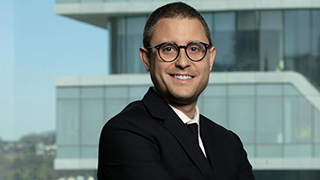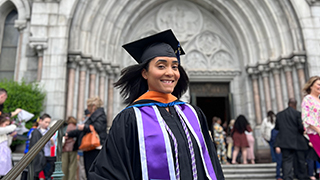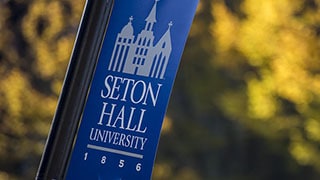How Investing in K-12 Computer Science Teacher Education Can Expand STEM Research and Workforce Capabilities
Tuesday, April 8, 2025
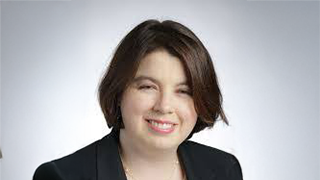
Katherine G. Herbert-Berger, Ph.D., will deliver the annual Charles H. Franke Memorial Lecture.
Distinguished scholar, educator and career bioinformatics and database researcher Katherine G. Herbert-Berger, Ph.D., will deliver the annual Charles H. Franke Memorial Lecture during Department of Mathematics and Computer Science Petersheim Day on Friday, April 25, a highlight of the 29th annual Petersheim Academic Exposition: Share, Honor, Unite. Herbert-Berger, professor of computer science at Montclair State University, will address the topic, “Communication and the Scientific Workforce: How Investing in K-12 Computer Science Teacher Education Expands STEM Research and Industry Capabilities.”
The Franke Memorial Lecture is hosted by the Department of Mathematics and Computer Science of the College of Arts and Sciences at 1:15 p.m. in room 109, Arts and Sciences Hall. Those unable to attend in person can participate by livestream. The program will be followed by the induction ceremony for the New Jersey Delta Chapter, Pi Mu Epsilon Mathematics Honor Society. Afterwards, the John J. Saccoman Graduation Awards will be presented by John Saccoman, Ph.D., mathematics program advisor and chair, Department of Mathematics and Computer Science. The concluding event will feature mathematics, computer science and data science students’ poster presentations from 2:45 to 4 p.m. in room 110, Arts and Sciences Hall.
Thomas J. Marlowe, Ph.D., professor emeritus of mathematics and computer science and a Petersheim Planning Committee member, explained the significance of the day.
Marlowe shared:
The annual Charles H. Franke Memorial Lecture commemorates our former chair, Charles (Charlie) Franke, who is remembered as an excellent teacher, researcher, administrator, mentor and friend of the department and many of its faculty. During his tenure as chair, the department greatly expanded its research presence and developed innovative courses, both for majors and non-majors. As importantly, it was on his watch that the department incorporated computer science in its mission, and he both served as the first computer science coordinator and was the first of the faculty to return for an additional graduate degree in the field. Charlie also enjoyed fishing and was a serious chess player and a tournament bridge player ranked as an expert.
Initiated by former chair Tuck Washburn, the Franke Lecture became a key event in the department’s Petersheim Exposition program, complementing the student poster session, induction of students into the mathematics honor society Pi Mu Epsilon and presentation of the John J. Saccoman Graduation Awards in mathematics and in computer science, which was established in memory of former chair John J. Saccoman, a cherished colleague of Franke.
Marlowe reminisced:
The first Franke Lecture was given by Dr. Ron Infante, a close friend and former student of Charlie’s and a former faculty member in the department, on Dr. Franke’s research, speaking — as Charlie always taught — entirely without notes. Over the years, the Franke Lecture has featured distinguished scholars, both mathematicians such as John Conway, Ron Graham, Janos Pach and computer scientists like Shriram Krishnamurti and Elaine Weyuker. I was privileged to give last year’s lecture on the four rules of software engineering. The lectures have always presented significant mathematical, computing or pedagogical content in a way designed to appeal to faculty and students alike, often with a touch of humor, vivid examples or artful presentation. Ron Graham’s lecture on the mathematics of juggling balls at different frequencies, accompanied by actual juggling, was a stellar example. This year’s lecture will be given by Professor Katherine G. Herbert-Berger of Montclair State University, who is increasingly recognized as an important figure in K-12 teacher professional development in computing.
Pivoting to a 'New Normal' Almost Daily
“We are currently seeing an unprecedented time in education and industry where we
are pivoting to the ‘new normal’ almost daily,” said Herbert-Berger, who explained,
“According to Pew Research, while the public generally has a positive view of science
and STEM fields, we are seeing shifts in public opinion concerning these topics. Most
Americans, while respecting STEM, see it as inaccessible for many reasons — cost,
confidence in the subject, educational opportunities, the conceptual gap and credentials
needed to participate in the field.”
She shared that at the same time, according to the CSTA, Code.org and the Bureau of Labor and Statistics, New Jersey is seeing an upsurge in opportunities for people with computing skills. On average, over the past three years, New Jersey has had 17,000 computing jobs available per month. "When we consider that the state only generates approximately 3,000 students in computing-related fields (and rising) per year, the New Jersey education community needs to consider how to help New Jerseyans access these opportunities. Concurrently, computer science as a field is often categorized by the public as the public expecting computer scientists to exhibit behaviors that the general public considers ‘geeky’ or ‘nerdy.’ While the field has made efforts to be more welcoming to all, education models persist in using classical techniques to teach computer science. These models are no longer sufficient, especially in our post-COVID, social-media-centered world where students’ fundamental learning capabilities have changed,” shared Herbert-Berger.
Herbert-Berger noted:
Integrative, interdisciplinary approaches help students understand what is the basics of computing and how computing can help them explore the world; these techniques can help demystify STEM and help people access these lucrative careers. Essential facets include computational thinking, communication, teamwork and other soft skills, knowledge of applications and modern approaches, including artificial intelligence and data science, and a basic understanding of ethical issues, complementing experience with design, coding and robotics, as well as artificial intelligence and data science. If we are to develop the state’s computing capabilities and workforce, the most important task will be to reach students, teachers and the public where their learning is at — hopefully with a sense of fun, interest, curiosity and engagement.
The presentation will look at these issues and how the Montclair Hub and DATA3 programs have challenged models for computer science education. It will include audience participation in activities to challenge understanding of computing and interdisciplinary research.
Global Expert Anthony Scriffignano To Attend
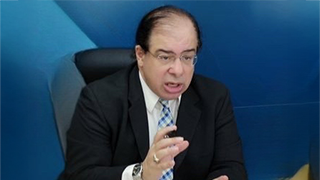
Anthony Scriffignano, Ph.D.
Among those who plan to hear Herbert-Berger’s keynote address in-person is internationally recognized data scientist Anthony Scriffignano, Ph.D., who previously taught in the University’s Department of Mathematics and Computer Sciences. He has an extensive background in linguistics and advanced algorithms, leveraging that background as primary inventor on multiple patents worldwide.
Among Scriffignano’s credentials over 40 years in the field is distinguished fellow and member of the Loomis Innovation Council of The Stimson Center, a nonprofit nonpartisan Washington, D.C. think tank that aims to enhance international peace and security through analysis and outreach. He has also served as a member of the OECD Network of Experts and AI working group on implementing trustworthy AI, focused on benefiting people on the planet, and served as a commissioner for the Atlantic Council, most recently contributing to a report on the geopolitical impacts of new technology and data.
Scriffignano noted,
It has been my great good fortune to work with Dr. Katherine Herbert-Berger, who is without doubt a superb example of the true scholar practitioner. She continues to do important, fundamental work in advancing the knowledge of evolving capabilities in data science, artificial intelligence and related fields. She is a uniting force for industry experts and educators at all levels. It is my great pleasure to see her sharing knowledge and experience with colleagues at Seton Hall, which has always maintained a spirit of bringing thought leadership to a broad spectrum of students.
Distinguished Educator, Researcher, Author, Advocate
Herbert-Berger received her Bachelor of Science in mathematics from St. Peter’s College
and her Master of Science and Ph.D. in computer science and data mining for bioinformatics
from New Jersey Institute of Technology. A member of the Montclair State faculty since
2004, she serves as director of the New Jersey Department of Education Northern New
Jersey Montclair State University Computer Science Education Hub and associate director
of the Bristol-Myers Squibb Center for Science Teaching and Learning Professional
Resources in Science and Mathematics. Previously, she created and led the development
of Montclair’s nationally ranked Master of Science in Applied Information Technology
and served as computing and technical lead for the New Jersey Health and Human Services-funded
New Jersey Autism Center of Excellence.
Her career interests involve interdisciplinary research, computer science pedagogy and community outreach. She also has ongoing research in bioinformatics, databases, accessibility, neurodiversity and space weather with the Earthcube group. Through the hub and other grants from the National Science Foundation, the State of New Jersey and various institutions, she has worked directly with designing computer science lessons and curricula with more than 500 K-12 teachers across more than 100 Northern New Jersey school districts who then, in turn, teach more than 120,000 northern New Jersey students through holding more than 150 professional development and professional learning community events. She has produced more than 60 conference and journal publications, has mentored more than 50 students in graduate and undergraduate theses or capstone projects, participated in multiple grant panels and program committees, and supervised collaborative education or internship programs. She continues to maintain scholarly relationships with many of her former mentees.
Besides the hub, another key project Herbert-Berger initiated is the National Science Foundation Research Education for Teachers DATA3 Program, which brings middle and high school teachers and community college faculty together for an interdisciplinary program spanning data science, computer science, artificial intelligence, robotics and space weather. The program has included industry speakers, visits to research labs (including the NJIT Earthcube lab) and classrooms. A total of 15 teachers have published 18 conference papers in the past two years (plus posters by their own students), developed multiple teaching resources and participated in multiple professional development and learning events with other teachers, as well as training teachers on the work and resources they have developed.
Herbert-Berger’s career philosophy centers around her collaborative approach. Through her grants, scholarship, curriculum and course development, she has worked at Montclair with other STEM departments, the College for Education and Engaged Learning and multiple offices and special programs. Her research collaborators have included faculty from NJIT, Rutgers University, Seton Hall University, William Paterson University, St. Peter’s University, Adelphi University and Drew University. She welcomes new collaborators and is always open to exploring new projects.
Categories: Education, Science and Technology




